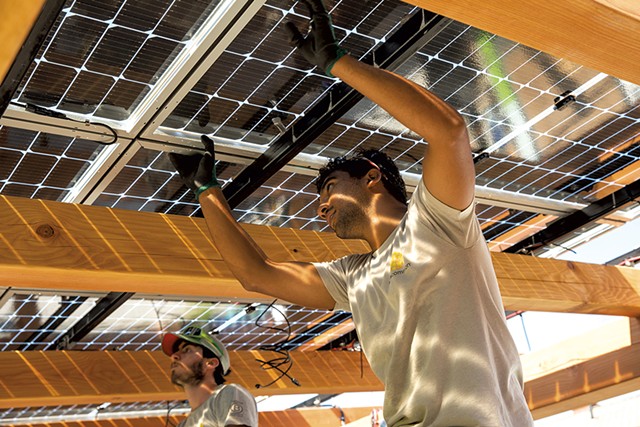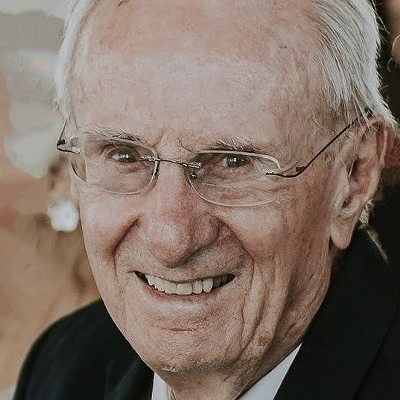
- Courtesy Of Patrick Mccormack
The merger of SunCommon with iSun reflected an ambitious vision to become a publicly traded, socially conscious, Vermont-based leader in the U.S. solar industry.
Instead, three years on, the combined company has melted down, leading to abrupt layoffs, lawsuits, near-worthless stock and, now, bankruptcy.
iSun claims it was hemorrhaging $250,000 per week by the time it filed for Chapter 11 bankruptcy protections in a Delaware federal court on June 3. In a legal filing, CEO Jeffrey Peck said the company was on "the precipice of shutting down." It was saved only by a bridge loan from a Texas energy investment firm, Siltstone Capital. During a hearing last week, a federal judge approved $4 million in emergency financing that will allow iSun to avoid liquidation.
"We actually run out of money at the end of this week," iSun attorney Michael Busenkell told the judge in explaining the request.
To avoid switching off the lights entirely, iSun's executives have proposed a court-overseen sale of the company to an affiliate of Siltstone Capital, with the proceeds used to pay off creditors. What happens after the so-called Section 363 sale is anyone's guess.
iSun's collapse is the latest indication of troubles in the U.S. solar installation industry. High interest rates have slowed demand among residential customers, and states such as California have cut back solar incentives. The bankruptcy also represents the failure of an aggressive growth strategy by iSun's leaders, who have tried to transform a local, family-owned electric contractor into a dominant regional player in every sector of solar.
Most solar companies in the Northeast are small and specialized. iSun, headquartered in Williston, installs commercial and industrial-scale arrays. In 2021, iSun made a $40 million play to buy SunCommon, the largest rooftop solar installer in Vermont, and gain a foothold in the residential sector, too.
It was an intriguing partnership. SunCommon was born of the nonprofit political advocacy organization Vermont Public Interest Research Group and later organized as a public-benefit corporation — a state designation for firms with a social purpose. iSun dates back to 1972, when Peck's father founded Peck Electric. Jeffrey Peck transitioned the family business into solar during the Great Recession and took it public in 2019, making iSun one of just a few publicly traded Vermont companies. At the time, the combined company had about 350 employees, a majority of whom worked in Vermont.
iSun has sought to expand outside Vermont into markets up and down the East Coast in order to take advantage of anticipated growth in the solar industry. The company took in nearly $100 million in revenue last year, a record high. But iSun has not been profitable: It reported a $19.4 million operating loss last year, smaller than its whopping $53.8 million loss in 2022, according to filings with the U.S. Securities and Exchange Commission.
Still, Peck earned $945,000 last year, including a $267,500 bonus, while then-chief financial officer John Sullivan was awarded a $152,500 bonus.
Short on cash, iSun has struggled over the past year to find new financing needed to pay its bills. It borrowed $8 million in December at an interest rate exceeding 20 percent.
In March, the company announced that Peck was being replaced as CEO by Bob Zulkoski, a private-equity expert who cofounded the venture capital fund Vermont Works. Zulkoski headed a three-person "triage team" whose job was to chart a new path for the ailing company. That's according to emails included in a new civil lawsuit that Zulkoski and the other two members of the "triage team" filed against iSun in state court.
Barely a month later, however, iSun announced that Zulkoski was out and Peck would return as CEO. CFO Sullivan, too, had departed. In a press release, the company termed the shake-up a "strategic restructuring of its executive team."
Peck planned to "continue the remarkable journey that Bob has paved for us," he said in the release.
The lawsuit alleges a less amicable breakup. Zulkoski refused to sign the company's annual report to investors "due to errors and inadequate disclosures in the document," his complaint alleges. iSun then terminated his employment "without explanation, cause or any notice." Zulkoski and others are seeking damages for breach of contract. So are SunCommon founders Duane Peterson and James Moore, who allege in a separate lawsuit that iSun has failed to make payments due to them that are related to the 2021 sale.
iSun's publicly released annual report, signed by Peck, noted in April that the company may not be able to "continue as a going concern." It also disclosed poor internal accounting practices that create "a reasonable possibility" of errors in company financial statements.
With Peck back as CEO, iSun announced a plan to consolidate its stock, whose share price had been plummeting — only to rescind the plan 24 hours later. By the end of May, NASDAQ removed iSun from the stock exchange, citing its low price of around 10 cents per share. iSun stock had reached a high of $26 per share in 2021; it now trades for less than 2 cents per share.
The company had fewer than 200 employees by the time it declared bankruptcy, according to court filings, down from 275 in April. Several current and former employees of SunCommon and iSun told Seven Days that the figure dropped because the company had laid off scores of its workers without notice in May. A laid-off SunCommon employee, who asked not to be named because he is looking for new work, said he was called into a private meeting with upper management — but not human resources staff — on May 29 and told he no longer had a job, effective immediately. The company did not provide a severance package, he said.
"Everybody was kind of upset about the lack of notice and lack of HR presence," the former employee said.
Ten SunCommon employees in Vermont and 16 in New York were laid off on the eve of bankruptcy, according to an email from company management shared with Seven Days. The total number of layoffs within iSun and its subsidiaries was unclear.
In its bankruptcy petition, iSun blamed high interest rates for slowing consumer demand, especially in the residential market, and for raising the cost of new financing.
Siltstone Capital, which touts its large portfolio of oil and gas mineral rights in Texas and Appalachia, did not respond to a request for comment about its plans for iSun, should the court-overseen purchase go through. Peck requested questions in writing. He did not respond to them directly but provided a statement saying the bankruptcy and coming auction will "ensure our long-term sustainability and competitiveness." He said company operations will "continue as usual."
"We are committed to minimizing any disruption to our employees, customers, and vendors during this period," Peck wrote.
Vermont solar-industry advocates said iSun's turmoil doesn't reflect the health of the broader industry in the state.
"I'm just not hearing from other folks in the solar industry in Vermont that they're not able to make a go of it," said Peter Sterling, executive director of Renewable Energy Vermont, an industry advocacy group.
His group and others have criticized the state's Public Utility Commission for steadily lowering net-metering payment rates, reducing payouts to customers who sell excess solar-generated electricity back to the grid. On May 30, the commission announced another reduction that will take effect later this summer. But Sterling said there's still plenty of work for solar installers in Vermont.
Nationally, industry analysts predict slower growth for solar in the years ahead. Analysts at energy research firm Wood Mackenzie expect solar installations to increase by roughly 3 percent per year through 2029.
"While this is certainly proof of the solar industry's strong standing in the energy transition, it also represents a slowdown of industry growth," the firm wrote in its latest report.
Norwich Solar CEO Jim Merriam, whose leaner firm develops commercial projects, agrees. "I think the industry at large is pretty stable," he said.
A more modest market isn't a huge problem for his company, which employs about 40 people, he said.
"We're pacing our growth based on what we see on the street," Merriam said. "We don't have that external pressure from investors to grow, grow, grow."











Comments
Comments are closed.
From 2014-2020, Seven Days allowed readers to comment on all stories posted on our website. While we've appreciated the suggestions and insights, right now Seven Days is prioritizing our core mission — producing high-quality, responsible local journalism — over moderating online debates between readers.
To criticize, correct or praise our reporting, please send us a letter to the editor or send us a tip. We’ll check it out and report the results.
Online comments may return when we have better tech tools for managing them. Thanks for reading.